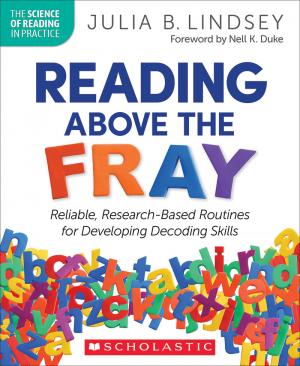
Reading Above the Fray: Reliable, Research-Based Routines for Developing Decoding Skills
Teaching phonics is one part of a complete reading program supporting early readers. As educators, we aim to help students understand the link between sound and symbol, an essential tool as they progress in reading. But a tool needs to be used: a hammer without a nail is of limited use! In this new book, Julia B. Lindsey explains it is through the process of decoding that students apply phonics knowledge when reading and writing authentic texts. Lindsey defines decoding as the product of phonemic awareness and phonics, so students know “how to use soundspelling relationships to read.”
This book is a resource for teachers who want to deepen their skills and knowledge to support beginning readers. Lindsey has reviewed up-to-date research to suggest routines, and her book answers a question that both new and experienced teachers grapple with: “What do I need to know and do tomorrow… to make sure my students can and want to read?”
In the first two chapters, Lindsey introduces foundational skills, including oral language, vocabulary, phonological awareness, phonics and fluency. She reminds us that while instruction in these skills is important, the larger goal is to provide an efficient path to reading so students can focus on “comprehension and knowledge-building work.” She also highlights cultural responsiveness and its essential place in our teaching for ensuring the success of all students.
The remaining chapters tackle the key elements of decoding: oral language and vocabulary, print concepts, phonemic awareness, alphabet knowledge, sound-spelling relationships and chunking. Each chapter follows the same framework. She defines the element, summarizes the research and describes why it is important. Lindsey shares key principles to consider as teachers incorporate the element into instruction and shares practical routines which she calls essential instructional swaps. These swaps are easy to implement. Related resources are available online.
I recommend Reading Above the Fray to any educator working with beginning readers or students who are finding the process of learning to read challenging. I appreciate how Lindsey honours the work of teachers and provides simple ways to build a toolkit of instructional routines. With the ongoing public discussion of approaches to teaching literacy, including the Ontario Right to Read recommendations, teachers may feel confused or overwhelmed with competing ideas. Lindsey helps bring practical clarity by bringing current research into the classroom in ways that teachers can incorporate into their existing programs.
Yvonne Messenger is a member of the Halton Teacher Local.